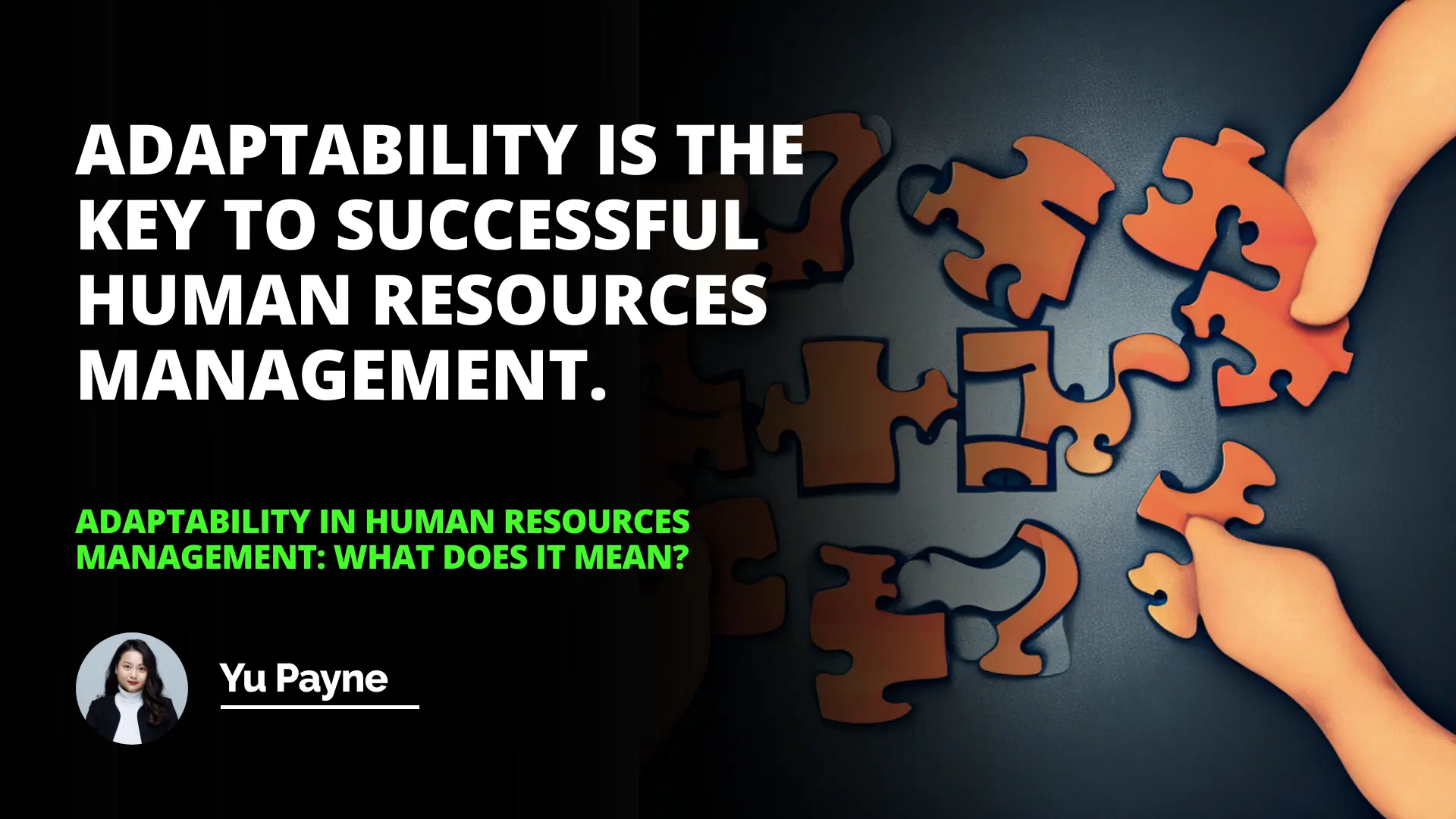
This article explores the concept of adaptability, its importance in human resources management, the benefits and challenges of adaptability, and how to foster a culture of adaptability. It explains that adaptability is critical in human resources management, as it allows organizations to respond quickly and effectively to changes in the environment, customer needs and expectations, and employee attitudes and behaviors.
The article discusses the benefits of adaptability, such as increased marketability and improved performance, as well as the challenges, such as unanticipated changes and the response to change. Finally, it provides advice on how to foster a culture of adaptability.
Introduction
What is Adaptability?
Flexibility and Versatility
Adaptability in Human Resources Management
Overview
Introduction: Adaptability has been a topic of discussion for centuries, from Aristotle and Empedocles in ancient Greece to modern-day researchers. Adaptability is responding to unanticipated changes or new conditions in our environment. It is related to flexibility and versatility, though the two terms are slightly different.
Flexibility is the ability to change or be changed quickly based on the situation, while versatility means having a variety of capacities. In this article, we will explore the concept of adaptability, its importance in human resources management, the benefits and challenges of adaptability, and how to foster a culture of adaptability.
Adaptability in Human Resources Management
Adaptability is a critical concept in human resources management. Organizations must respond quickly and effectively to changing market conditions and customer needs. Adaptability is also essential for maintaining a competitive edge in the marketplace. Human resources managers must recognize and respond to changes in the environment and develop strategies for managing and leveraging these changes.
Examples of adaptability in human resources management include the ability to adjust staffing levels in response to changes in customer demand, to develop new processes and procedures in response to changes in the competitive landscape, and to develop new training programs and initiatives in response to changes in technology. Additionally, human resources managers must be able to recognize and respond to changes in employee attitudes and behaviors and develop strategies for managing and leveraging these changes.
Benefits of Adaptability
Flexible Benefits: A Comprehensive Guide to a Modern Workplace Paradigm
Onboarding Process: Accelerating Employee Integration and Retention
The primary benefit of adaptability is increased marketability. Organizations that can respond quickly and effectively to environmental changes are better positioned to compete in the marketplace. Additionally, organizations that can respond rapidly and effectively to changes in customer needs and expectations are more likely to retain customers and attract new ones.
Adaptability also leads to improved performance. For example, organizations that can respond quickly and effectively to environmental changes can better meet customer needs and expectations. Additionally, organizations that respond rapidly and effectively to changes in employee attitudes and behaviors can better motivate and engage employees.
Challenges of Adaptability
The primary challenge of adaptability is unanticipated changes. Organizations must anticipate and respond to changes in the environment, customer needs and expectations, and employee attitudes and behaviors. Additionally, organizations must be able to quickly and effectively respond to changes in technology and the competitive landscape.
Another challenge of adaptability is the response to change. Organizations must recognize and respond to changes in the environment, customer needs and expectations, and employee attitudes and behaviors. Additionally, organizations must be able to develop strategies for managing and leveraging these changes.
Conclusion: Adaptability is a critical concept in human resources management. Organizations must respond quickly and effectively to changing market conditions and customer needs.
Adaptability leads to increased marketability and improved performance, but it also presents challenges, such as unanticipated changes and the need to respond to change. For example, organizations must anticipate and react to changes in the environment, customer needs and expectations, and employee attitudes and behaviors.
Additionally, organizations must be able to quickly and effectively respond to changes in technology and the competitive landscape. By fostering a culture of adaptability, organizations can better position themselves to compete in the marketplace and meet customer needs and expectations.
Adaptability is the key to successful Human Resources Management.
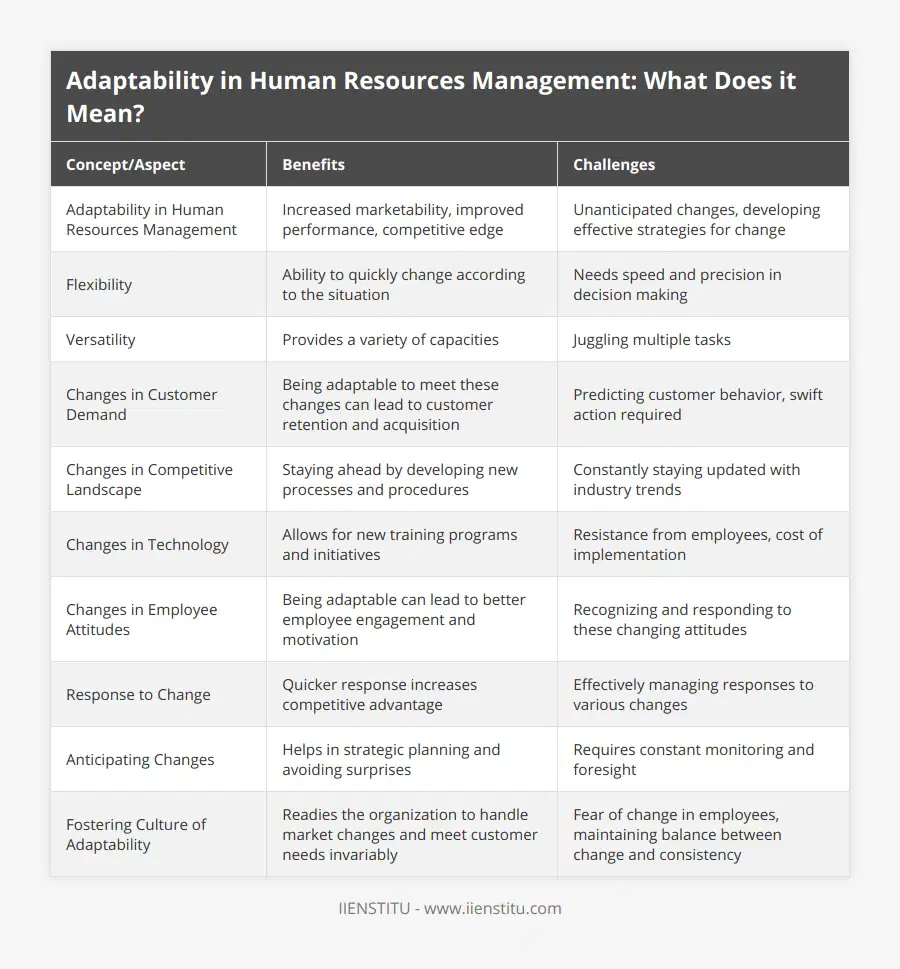
Frequently Asked Questions
What are the benefits of adaptability in Human Resources Management?
Adaptability is a critical concept in Human Resources Management (HRM). It refers to the ability of an organization to respond to changes in the external environment, as well as in internal operations, to remain competitive. In addition, this concept is closely linked to an organization's ability to create, maintain and sustain a positive and productive working environment for its employees.
One of the main benefits of adaptability in HRM is that it allows for the developing of a flexible and dynamic organizational culture. By remaining open to change and responding to the organization's and its employees' ever-changing needs, an organization can create a culture that is conducive to innovation and creativity. This, in turn, leads to increased employee engagement, motivation, and satisfaction. Moreover, a flexible organizational culture is also beneficial for organizational productivity, as employees are more likely to be productive when they are supported, challenged, and engaged.
Adaptability also enables organizations to manage their resources better. By quickly and effectively responding to changes in the external environment, organizations can ensure that their resources are used most efficiently. This ultimately leads to a reduction in costs and an increase in profitability. Additionally, adaptability in HRM allows organizations to manage their workforce better, as they can quickly adjust their workforce needs to meet changing market conditions.
Finally, adaptability in HRM provides organizations with the ability to remain competitive in a rapidly changing business environment. By quickly and effectively responding to changes in the external environment, organizations can ensure that they stay competitive in the marketplace. This, in turn, helps organizations remain profitable and thrive in the long run.
In conclusion, adaptability is an essential concept in Human Resources Management with numerous benefits. It allows organizations to create a flexible and dynamic organizational culture, better manage their resources, and remain competitive in the ever-changing business environment. As such, adaptability should be an integral part of any organization's HRM strategy.
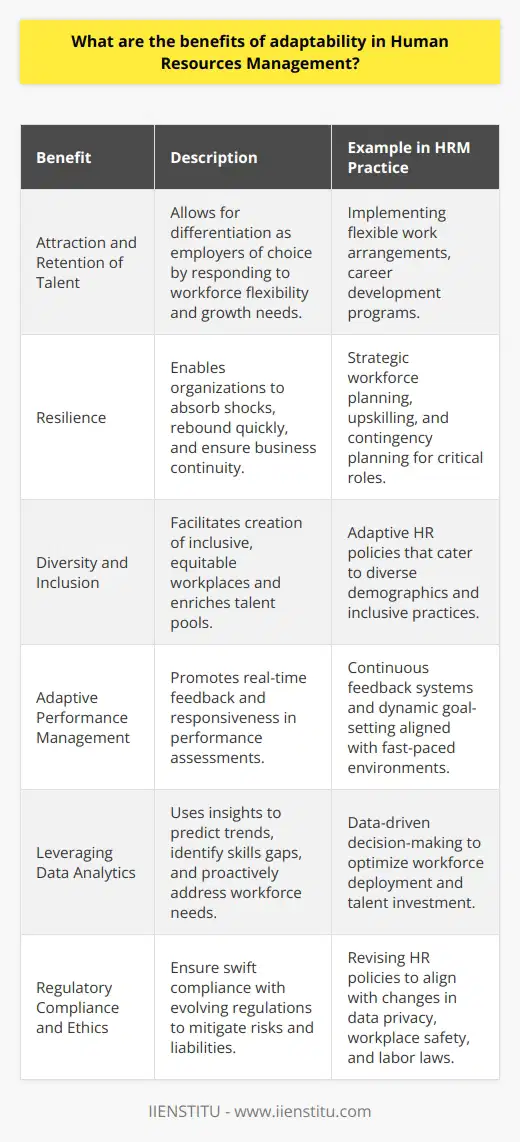
How can Human Resources Management increase its adaptability?
In today's ever-changing and highly competitive business environment, Human Resources Management (HRM) must adapt quickly and efficiently to stay ahead of the curve. To do this, HRM must be able to evaluate and adjust its strategies as needed to meet the demands of the current environment and ensure the organization's long-term success. There are several key strategies that HRM can use to increase its adaptability.
The first strategy is to develop a culture of continuous learning. HRM should ensure that its employees can learn and develop their skills continuously. This can be done through training, seminars, workshops, and other development activities. Additionally, HRM should ensure that there are systems in place that allow employees to share their knowledge and experiences, as this will help to ensure that the organization is always up-to-date with the latest trends and practices.
The second strategy is to create an open organizational culture. HRM should create an environment where employees feel safe to suggest new ideas and are empowered to take risks. This will allow the organization to be more open to change and new ways of thinking. Additionally, HRM should provide employees with the necessary tools and resources to empower them to develop innovative solutions to the organization's challenges.
The third strategy is to develop a flexible work environment. HRM should focus on creating an environment where employees can work relaxed and agilely. This can be done by implementing flexible working hours, remote working, or even job sharing. Additionally, HRM should be open to using emerging technologies and tools to increase efficiency and productivity.
Finally, HRM should ensure that the organization can respond quickly to changes in the external environment. This can be done by implementing an effective monitoring system that can identify changes in the external environment and provide timely feedback to HRM. Additionally, HRM should ensure that it can respond quickly to any changes in the internal environment, such as changes in the organizational structure or changes in the organization's goals and objectives.
By implementing these strategies, HRM will be able to increase its adaptability and ensure that it can quickly and effectively to the's changing organization's changing needs intensionally; HRM will be able to ensure that the organization can remain competitive and meet the demands of the current environment.
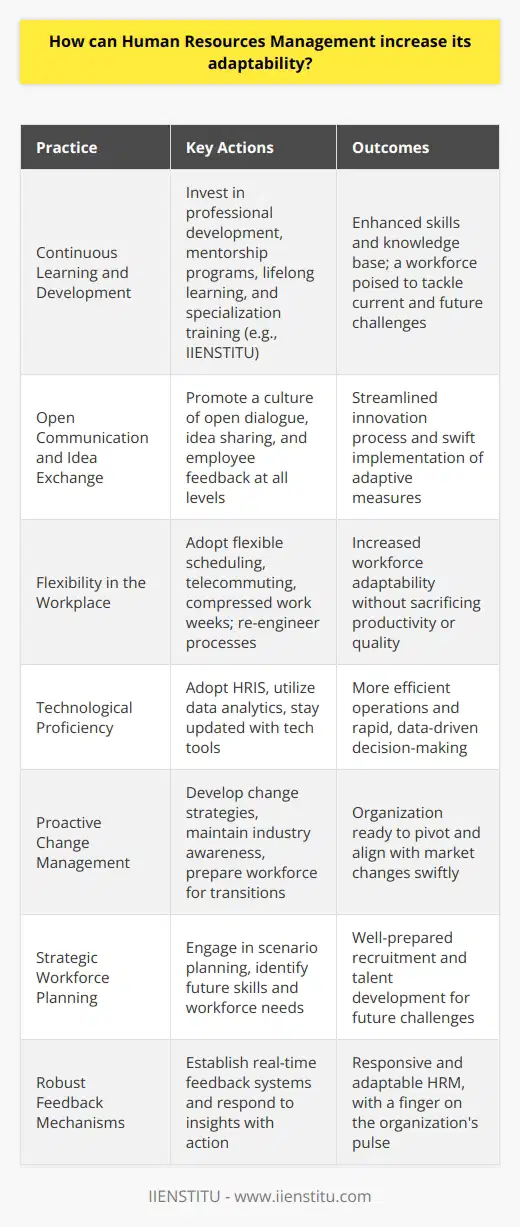
What challenges can arise from implementing adaptability in Human Resources Management?
Implementing adaptability in Human Resources Management can be difficult, as it can cause many challenges and obstacles. Adaptability in Human Resources Management refers to the ability of an organization to quickly and effectively adjust to changing needs, regulations, and other factors. While the potential benefits are numerous, there are several potential pitfalls associated with adopting Human Resources Management practices.
One of the primary challenges associated with implementing adaptability in Human Resources Management is the need to stay updated with changing regulations. As regulations and laws governing Human Resources Management change, organizations must be able to quickly and effectively adjust their practices to ensure compliance. Organizations must also be able to adapt rapidly to changing workforce needs. As the needs of the organization change, Human Resources Management practices must be able to adjust to meet those needs quickly.
Another challenge associated with implementing adaptability in Human Resources Management is maintaining consistency and fairness. Organizations must be able to quickly and effectively adjust their practices to meet changing needs while at the same time ensuring that those changes are applied consistently and fairly. This can be difficult, as the changes may affect different employees differently.
Finally, implementing adaptability in Human Resources Management can be challenging due to the need to adjust training and development. As an organization's workforce needs change, Human Resources Management practices must be able to quickly and effectively adjust the training and development of employees to meet those needs. This can be difficult, as training and result can vary greatly depending on the type of organization and the particular job duties of the employee in question.
In conclusion, implementing adaptability in Human Resources Management can be a challenging task. Organizations must quickly and effectively adjust their practices to meet changing regulations, workforce needs, and training and development needs. By understanding the potential challenges associated with this process and taking steps to address them, organizations can ensure that they can effectively implement adaptability in Human Resources Management.
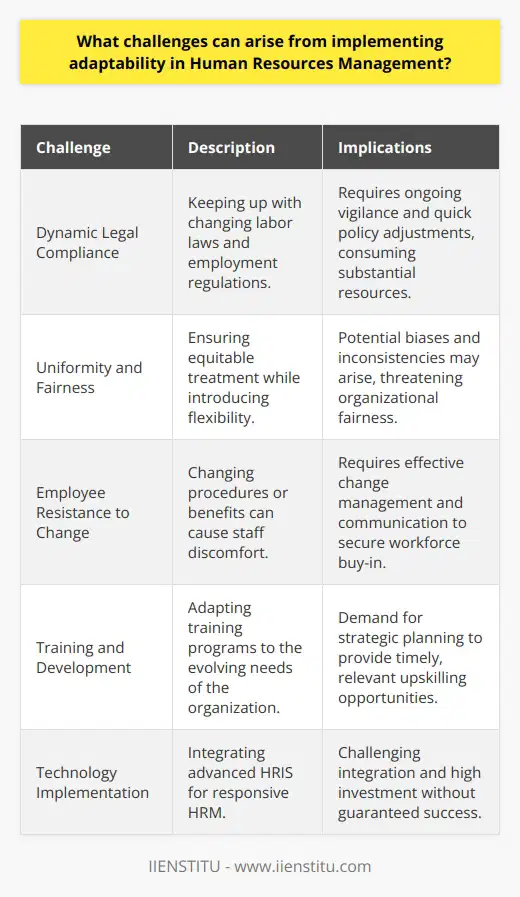
What are the key components of employee adaptability skills?
Key Components Overview
Adaptability skills encompass various qualities that enable employees to respond effectively to changes, maintain flexibility, and work well under different circumstances. This paragraph will discuss four key components of employee adaptability skills: cognitive flexibility, emotional management, communication, and willingness to learn.
Cognitive Flexibility
Cognitive flexibility refers to the ability of an individual to adapt their thinking and problem-solving strategies according to the demands of new situations. Employees possessing high cognitive flexibility can switch between tasks, adjust to novel environments, and approach challenges from multiple perspectives. This skill ultimately contributes to better decision-making and innovative solutions.
Emotional Management
The ability to manage emotions effectively is crucial in times of change and uncertainty. Adaptable employees have the resilience to cope with stress, anxiety, or setbacks, and can maintain a positive attitude towards work. Emotional management also involves the capacity to recognize and empathize with the emotions of others, promoting supportive and collaborative work environments.
Communication
Effective communication is essential for employees to adapt to changing environments or expectations. This involves active listening, clear expression of ideas, and demonstrating an open-minded attitude to receive feedback. Adaptable employees possess strong communication skills, enabling them to collaborate effectively with diverse teams and navigate through organizational changes.
Willingness to Learn
An eagerness and openness to learn is inherent to adaptability, as constant growth and development are necessary to cope with changing work conditions. Employees willing to learn demonstrate a commitment to lifelong learning, proactively seeking professional development opportunities and continuously updating their skillsets. This quality ensures that adaptable employees stay relevant, motivated, and prepared to face new challenges.
In conclusion, the key components of employee adaptability skills are cognitive flexibility, emotional management, communication, and a willingness to learn. Developing these abilities helps individuals thrive in various work environments, surpassing obstacles, and contributing to overall organizational success.
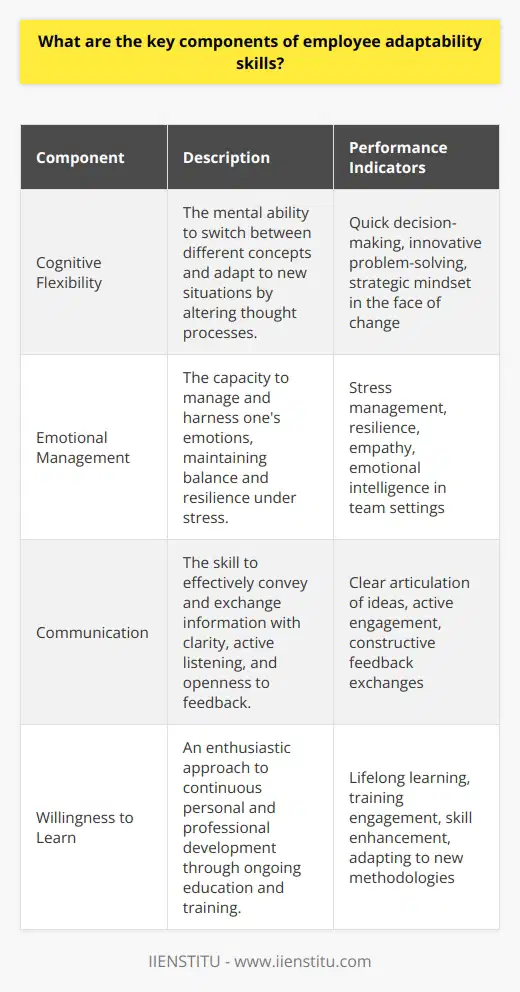
How do adaptability skills play a role in navigating organizational change and fostering innovation?
Adaptability Skills and Organizational Change
Adaptability skills are essential in navigating organizational change as they enable individuals to embrace new processes, systems, and ideas. Workers with high adaptability are better equipped to cope with uncertainty, adjust to new environments, and learn new skills. As organizations evolve, these employees can help to lead the transition and promote innovative thinking.
The Role of Adaptability in Fostering Innovation
Innovation relies on the ability to envision fresh approaches and take risks. Employees who demonstrate adaptability can challenge existing mindsets and push the boundaries of what is possible. By encouraging a culture of continuous learning, organizations can develop a workforce that thrives in change, and is open to innovation.
Emotional Intelligence and Adaptability
A key aspect of adaptability is emotional intelligence, which enables individuals to understand their own emotions and those of others, and adapt accordingly. This can be particularly helpful during periods of change, as it aids in managing conflict and creating a supportive environment where innovation can flourish.
The Impact of Empathy on Change Management
Empathy is a vital aspect of adaptability that contributes to successful change management. By recognizing and addressing the concerns of employees, leaders can facilitate a smoother transition and create buy-in for new initiatives. A workforce that feels heard and understood is more likely to embrace change and engage in innovative pursuits.
Learning Agility: The Cornerstone of Adaptability
Adaptability skills encompass an individual’s capacity for learning agility - the ability to learn from experience and apply those insights to new situations. By cultivating learning agility, organizations can foster a growth mindset, encouraging employees to continuously seek improvement and embrace change. In turn, this facilitates a culture of innovation, where novel ideas are met with enthusiasm and a willingness to adapt.
In conclusion, adaptability skills play a critical role in navigating organizational change and fostering innovation. By instilling a culture of continuous learning, emotional intelligence, empathy, and risk-taking, organizations can create an adaptive workforce that thrives during periods of change and propels them towards a future of constant innovation.
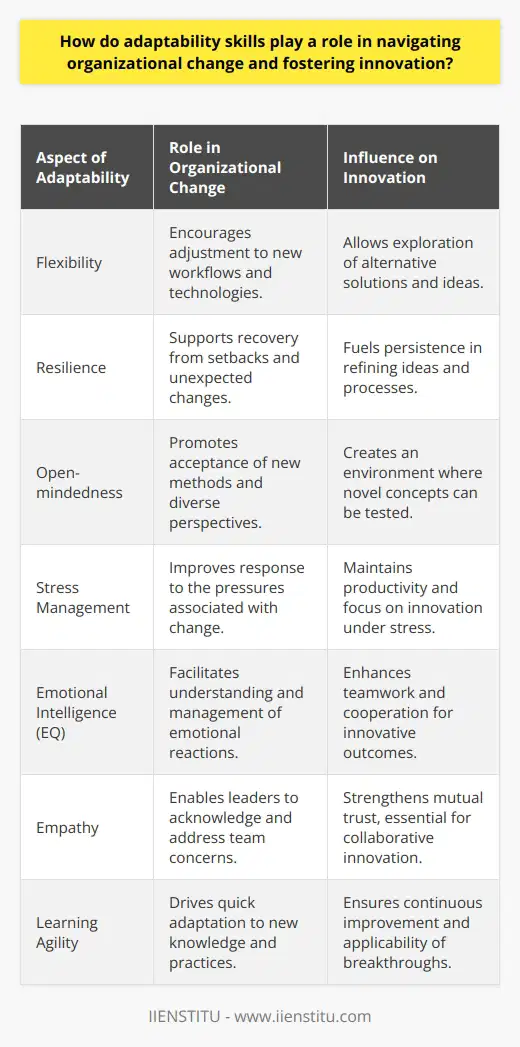
What strategies can management employ to foster a culture of adaptability within their organization?
**Strategies for Fostering Adaptability in Organizations**
**Effective Communication Channels**
Management must establish open and transparent communication channels, which encourage employees to share their ideas and concerns. This approach breaks down silos and creates an environment where everyone feels comfortable discussing change and innovation.
**Encourage Collaboration and Teamwork**
By promoting teamwork, organizations can create a culture where employees are more willing to adapt to new situations. Management should emphasize the importance of collaboration and provide the needed resources to foster employee engagement across different teams and departments.
**Continuous Learning and Development**
When organizations invest in continuous learning and development, they create a workforce that is more adaptable and better equipped to respond to changes in the business environment. As such, management must prioritize employee training programs, workshops, and seminars to upskill their workforce on an ongoing basis.
**Empower Employees in Decision-making**
Organizations with adaptable cultures often empower their employees to make decisions affecting their work. By providing workers with autonomy, management creates a sense of ownership and responsibility, which drives employee adaptability and innovation.
**Reward and Recognize Adaptability**
Recognizing and rewarding employees who demonstrate adaptability can be an essential strategy for fostering a culture of change. Management should create incentives and recognition programs that highlight the importance of adaptability and showcase success stories across the organization.
**Embrace Iterative Change**
Organizations can foster adaptability by embracing iterative change, or small, incremental adjustments over time. Rather than relying on large, dramatic shifts, management should encourage an environment in which change is a constant and ongoing process, allowing employees to adapt more easily.
**Promote Cross-functional Exposure**
Cross-functional exposure is a vital aspect of adaptability, as employees who understand multiple aspects of the organization can make better, more informed decisions. Management should provide opportunities for employees to work on cross-functional projects or job rotations to develop a deeper understanding of the entire organization.
In conclusion, the management can employ several strategies to foster a culture of adaptability within their organization. These strategies include effective communication channels, collaboration, continuous learning, empowering employees, recognizing adaptability, embracing iterative change, and cross-functional exposure. Together, these approaches create an environment where employees feel supported and motivated to adapt to evolving business conditions.



